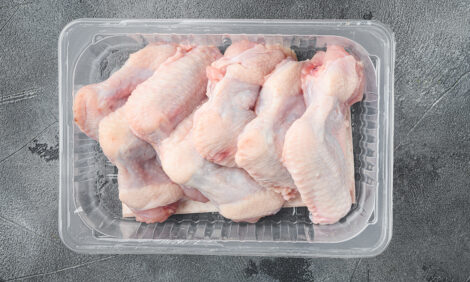



AVEC Annual Report 2012: Turkey
In its Annual Report 2012, the Association of Poultry Processors and Poultry Trade in the EU Countries, AVEC, offers an overview of the market situation for turkey, Salmonella testing of the meat and welfare of the birds.
Market Situation for Turkeys
Turkey production in the EU is concentrated in a few Member States. Since
2009, just five countries - Germany, France, Italy, the UK and Poland - have produced
more than 85 per cent of all EU turkey meat. Only a small number of companies
in a limited number of Member States are involved in the turkey primary
breeding sector. The consumption of turkey meat varies strongly
between Member States, with the percentage of consumers ranging from
0.2 per cent to 70 per cent.
The present situation as regards the price of raw materials and energy
costs in EU has fluctuated in the last 12 months and has forced prices of
turkey meat to go up. The decrease in turkey meat consumption is
explained by these constraints. When prices continue to accelerate the
consumption decreases.
The EU turkey production remains stable with an estimated 1.8 million tons.
No change in the production repartition in the EU is expected, unlike the pattern in previous years. Imports of turkey meat into the
EU have decreased with 18 per cent compared to the previous year, with Brazil as the
main source.
New Criterion in Place for Salmonella and EFSA Scientific Opinion
From 31 December 2012 onwards, the criterion for the absence of
Salmonella Enteritidis (SE) and Salmonella Typhimurium (ST) in 25g of turkey meat of
Regulation 2160/2003, Article 4 enters into force. Regulation 584/2008
establishes the objective reducing Salmonella prevalence in turkey flocks to
one per cent, also by 31 December 2012.
In May 2012, EFSA published its report evaluating the possible impact on
public health of reducing Salmonella levels in turkeys across the EU. The
Panel found that the dominant serovars are Salmonella Enteritidis,
Typhimurium, Kentucky, Newport, Virchow and Saintpaul.
Projecting a possible scenario (reduction of SE and ST of one per cent) a reduction
of 0.4 per cent in percentage of turkey transmitted salmonellosis could be achieved
but when adjusting the combined prevalence of all serotypes to one per cent, a 83.3 per cent
reduction equivalent to 2.2 per cent of all human salmonellosis could be expected.
The report concludes that vertical transmission of Salmonella and hatchery-acquired Salmonella contamination from breeding stock are important sources and the control in breeding but also during rearing is important.
Welfare of Turkeys
AVEC agrees that good farming practice and farm management are vital
for turkey health and welfare. Turkeys are, like other animals, sentient beings
and must be treated with respect.
The welfare of animals is important to society. Turkeys, like other animals
kept for meat production are kept in houses where the biological needs of
the turkeys are taken care of: appropriate nutrition, freedom of movement,
physical comfort and the need to perform natural behaviour. The turkeys
are protected against adverse climatic conditions, injury, fear and disease.
Progress or advance in feed, housing, equipment, medicines and genetic
research are taken into account to improve the conditions during rearing.
To respond to these demands, AVEC has in 2011 and 2012 set up a working
group with the aim to develop the AVEC Turkey Welfare Guide. After one
year of work, the draft guide is almost ready for final approval by the board
of AVEC The guide covers all aspects of turkey rearing at farm level.
December 2012











